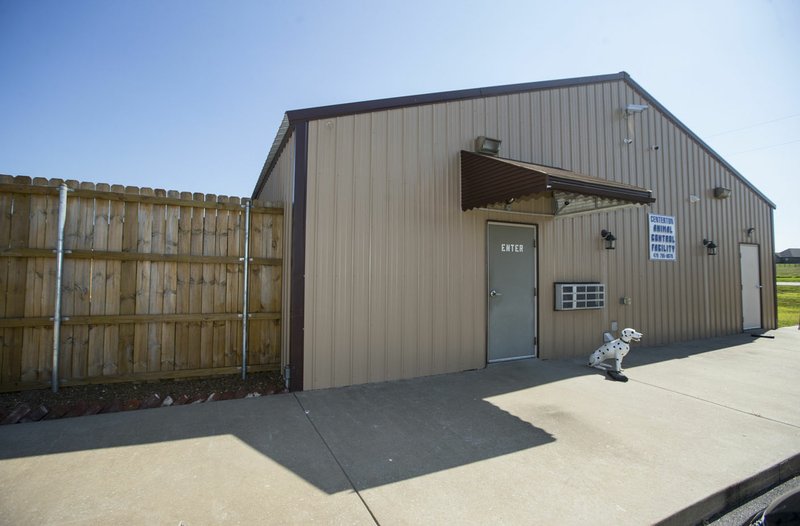BENTONVILLE — Bentonville doesn’t have an animal shelter. The city, with an estimated population of 51,000 people, is the fourth-largest in Northwest Arkansas, and it’s the only one in that region without one.
But it’s working to change that. A city committee has been studying the matter for several months, and on Tuesday, it plans to select an architect, a step toward building a shelter.
David Wright, Parks and Recreation director, is high on the project, saying a shelter would add a positive component to the city. “Quality of life doesn’t stop with parks,” he said. “Caring for pets fits under quality of life.”
A site for the shelter hasn’t been selected, and the cost to build and operate one has yet to be determined, he said. The city, which has three animal control officers who work under the Police Department, opened a 1.3-acre bark park along North Walton Boulevard in 2009.
Currently, the city has a contract with Centerton, population about 14,000 in Benton County, to care for the roughly 25 dogs a month it picks up, Centerton’s mayor said.
“What the community has said is Bentonville needs to manage its pet population. This is the direction taxpayers are telling us we should go. We want to be a better community for people who own pets,” Wright said.
Matt Colston, assistant manager of the shelter in Rogers, said facilities are needed for the health and safety of the community and the animals. The primary role of an animal control officer is to get aggressive animals off the streets and into a secure area. Also, stray animals can wander into traffic and be hurt or killed, he said.
Bentonville officials plan to ask residents early next year what they want the shelter to look like, Wright said. Ten architectural firms have expressed an interest in building the facility, said Debbie Griffin, city community relations and economic development director.
“This is not going to be a dog shelter,” Wright said. “It’s going to be a resource for citizens who own pets. It will enhance the lives of people with pets.”
The shelter would offer pet adoptions like those common at most animal shelters across the country. There also will be programming geared to pet owners and potential pet owners. A small area for cats is planned also, Wright said.
The Bentonville Pet Resource and Service Center Steering Committee worked for 18 months on a solution for animal services within the city before the decision was made in August to build a shelter.
The committee recommended a public/private partnership between the city and the Walton Family Foundation with a third party operating a pet resource center, according to an August city news release. That release announced the city’s decision to go solo.
Community input will play a big part in the shelter’s look, Wright said. He knows what he doesn’t want it to look like.
“It’s not going to be a cinder-block, ugly, white building with a sign outside that says, ‘Dog Pound,”’ he said.
Pet shelters in Aurora, Colo., and Denver are good examples, he said, of what he wants the building to look like and what services he wants the shelter to offer.
The Aurora Animal Shelter’s mission is to provide humane shelter, treatment and placement of animals, and to enhance and preserve the human-animal bond through education, outreach, adoptions and cruelty prevention, according to its website.
Aurora is a city of about 370,000 people east of Denver.
The Aurora shelter, built in 1983 and remodeled in 2004, can hold 74 dogs and 74 cats, said Carol Valentine, shelter supervisor.
Its programs include working with a local veterinary tech school to offer low-cost vaccinations. The shelter also has an agreement with PetSmart in Westminster, Colo., to offer adoptions, Valentine said.
Animals are given behavior evaluation tests to see how they might best fit with an adoptive family. The animals also are spayed, neutered and microchipped. “There is no longer that dog-pound mentality,” she said.
Bentonville now pays Centerton $100 per animal to shelter its dogs. The city paid $300,000 upfront for three years so Centerton could expand its shelter to accommodate Bentonville animals, Griffin said.
Wright said the new shelter is expected to cost more than what the city is paying Centerton.
The contract with Bentonville runs through 2021, said Centerton Mayor Bill Edwards. The Centerton shelter added 55 kennels and now has 73, and he hopes the agreement between the two cities can continue.
“They can stay as long they want. We want them to stay,” he said. “It’s very cost-effective for them.”
